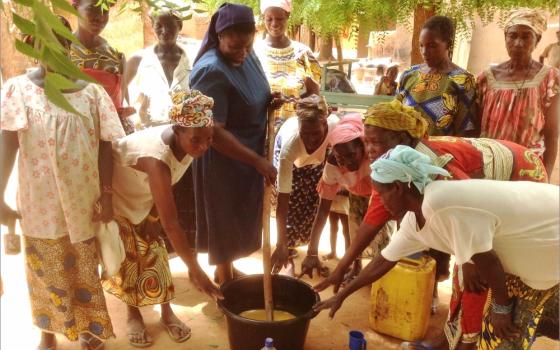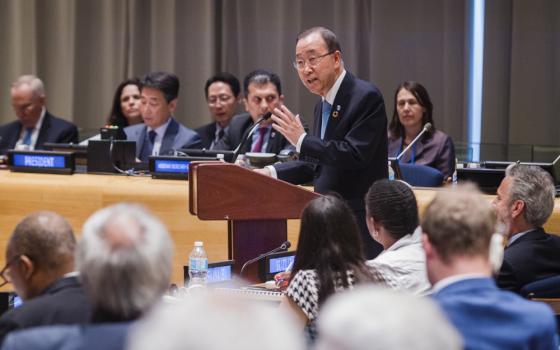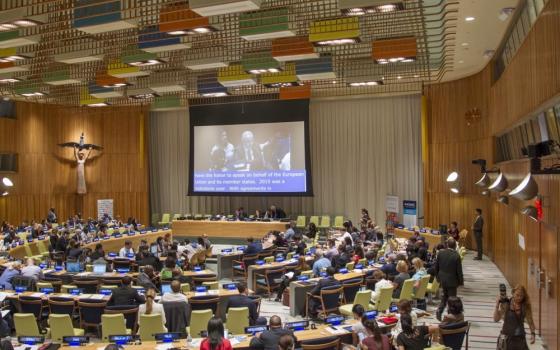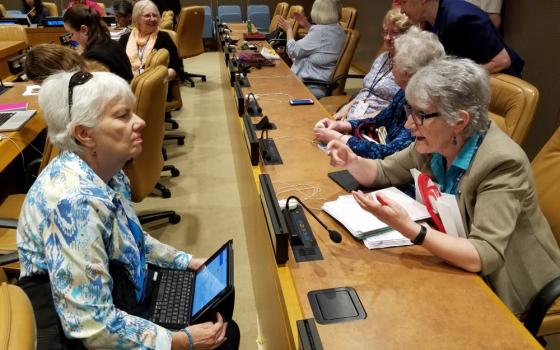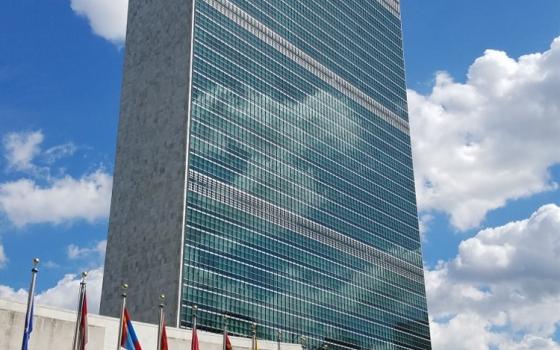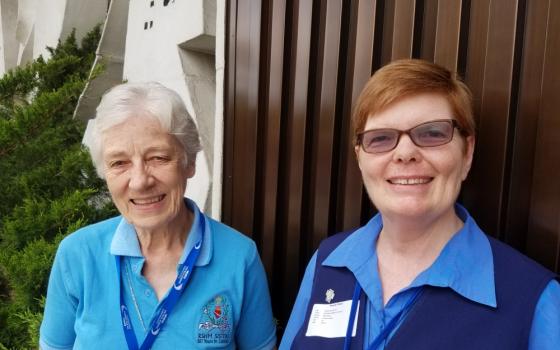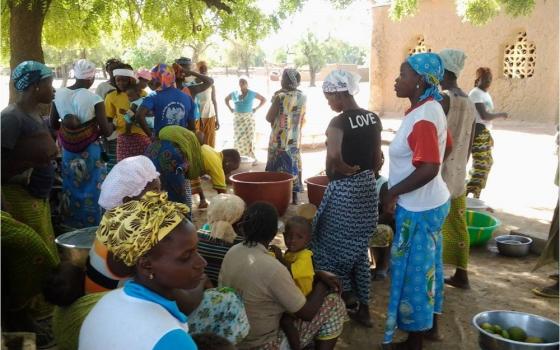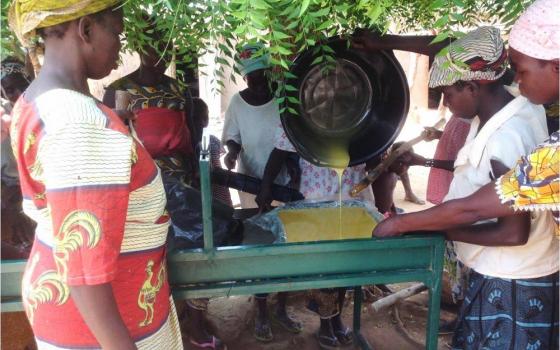Ready. Set. Go.
Leaders of the United Nations say the global body's ambitious agenda to eliminate global poverty and other ills is off to a good start but are reiterating the need for common efforts involving governments, non-governmental groups, business and others — including religious bodies in which Catholic sisters play a prominent role.
"We have embarked on a monumental and historic journey," U.N. Secretary-General Ban Ki Moon said July 19 during the U.N.'s July 11-20 High-level Political Forum on Sustainable Development, called to assess the first bit of progress on the U.N.'s 15-year effort, called Agenda 2030 for Sustainable Development.
Catholic sisters who work at the United Nations and have long been active in efforts to promote the cause of poverty reduction and environmental protection, were a strong and visible presence at the 10-day event.
They were not quiet. The sisters pushed the U.N. and governments not to ignore the work already being done at the grassroots to fight poverty and related problems.
"To the 193 nations supporting the SDGs — don't forget the wisdom of the people at the grassroots and don't forget their voice," said Sr. Margaret O'Dwyer of the Company of the Daughters of Charity, the official U.N. name, in an interview with Global Sisters Report, referring to the U.N.'s Sustainable Development Goals, the cornerstone of international efforts to eliminate poverty and other problems by the year 2030.
Echoing that sentiment was Sr. Elsa Muttathu, the U.N. representative of the International Presentation Association. "The way to sustainable development must involve empowerment of grassroots groups," she said.
However that work is done, it will be challenging.
In its release of the first Sustainable Development Goals Report, Thomas Gass, the U.N.'s assistant secretary-general for policy coordination and inter-agency affairs, offered the first baseline on how the global body will monitor progress for the 15-year effort, which was formally initiated in 2015.
Calling it a "review where the world stands at the start of this collective journey," Gass said despite progress in many areas over the last few decades, the world faces massive issues:
- About 800 million people still live in "extreme poverty" and experience hunger;
- Nearly six million children die annually before reaching the age of 5;
- 59 million children of primary school-age do not attend school;
- Nearly 2.5 billion people still do not have access to adequate sanitation.
Given such numbers, the global community needs to accelerate the pace of the development agenda, said U.N. Deputy Secretary-General Jan Eliasson. "Achieving the SDGs is a monumental task. There is no country in the world where all people have equal opportunities to fulfill their aspirations. Every country has poverty and inequalities to address. Every country has environmental problems to remedy," Eliasson said, quoted by the U.N. News Service.
Eliasson noted that the process is still in formation — some countries have begun efforts to implement the goals, while others are still trying to determine how to implement them. One aim of the 10-day event was to bring different parties together to discuss implementation as well as trying to determine how to monitor progress.
"We're still at the beginning now," said O'Dwyer, who represents her congregation at the U.N. along with Sr. Catherine Prendergast. O'Dwyer's colleague, Sr. Veronica Brand, who represents the Religious of the Sacred Heart of Mary, agreed, noting "There is a lot of listening at this point."
In a joint interview with GSR during the U.N. meetings, O'Dwyer and Brand said all efforts are needed as nations start the journey toward implementation. But they stressed that, at the grassroots, things are already happening.
"At the grassroots, people know what they need. They have the resources of getting out of poverty," O'Dwyer said. "Resilience is a key word," Brand added. "There is a lot on the ground for seeds that have already been planted to be strengthened."
Both O'Dwyer and Brand participated in a July 13 event that focused on the SDGs and "ensuring that no one is left behind," a key phrase in the U.N.'s 2030 Agenda. The presentation, by O'Dwyer's and Brand's congregations, the International Presentation Association, several United Nations-related NGO committees and the Catholic humanitarian groups CAFOD and Caritas Internationalis had as its centerpiece the release of a report focused on community-based local economies projects.
The report, authored by the NGO Committee on Social Development, focused on a 2015 survey of 70 grass-roots, community-based local economies projects in 26 different counties in which "people assessed their own needs and developed economic strategies to meet them." Projects included cooperatives; community farming and agricultural projects; small-scale industries and entrepreneurship projects; micro-finance and savings groups. All used, the report said, "a people-centered approach to engage individuals and groups that have been left behind by other efforts."
The projects included participation by Catholic sisters, including two cooperative projects in the Edo state of Nigeria which are managed by a group of people with disabilities. One focuses on the sale of food items; the other on selling kerosene. The Daughters of Charity provided a non-interest loan for startup capital.
The conclusion? "The cooperatives have saved local people time and transport costs to fuel stations and markets," the report said. "Fewer people are dependent upon handouts. Persons with disabilities are now seen no longer as objects of charity but as useful and responsible members of the community. They have greater self‐esteem and self‐confidence."
Overall, the report concluded that "grassroots projects have an important role to play," with one respondent from Kenya saying that "small projects that are well-managed may be more effective than major governmental initiatives."
The report also noted that community-based projects that develop "are most likely to identify and engage those who have been left behind by other development efforts," adding that "reaching the most vulnerable is very difficult and requires knowledge of local cultures and conditions and a sustained investment in the community." Most of the projects noted in the report are those that focus on groups that are most vulnerable — whether they be migrants, people with disabilities, those living in extreme poverty or people "oppressed by stigma," such as the Dalits in India or those living with HIV/AIDS.
"These groups are seldom engaged in mainstream social and economic institutions and therefore traditional approaches will continue to leave them behind," the report said. It also noted that focus on stigmatized groups can play "an important role in fostering attitude change in the larger community."
While the importance of small-scale projects is key to fighting poverty and related problems, national policies and programs are still crucial, said Sheka Bangura, a representative of the Ministry of Finance and Economic Development for the West African nation of Sierra Leone.
Bangura, who also spoke at the July 13 event, said that in his country, the SDGs are now "aligned" and "embedded" with formal government policies called the "Agenda for Prosperity." He praised "non-state actors" for their work in promoting knowledge and awareness about the SDGs to the grassroots but acknowledged serious challenges.
Sierra Leone is still recovering from a nearly 11-year-long civil war (1991-2002), and the state is still somewhat fragile, he said. The country faces revenue shortfalls and in recent years has been grappling with the effects of the Ebola epidemic and climate change.
Though not pessimistic about the SDGs, Bangura also acknowledged that when it comes to the 2030 Agenda, "It's a work-in-progress, unfolding."
Looking more broadly over the West Africa region, Samuel Zan Akologo, the executive secretary of Caritas Ghana, said he was not pessimistic but acknowledged that, for a number of countries struggling to get out of poverty, achieving all 17 goals in 15 years is likely to be "overwhelming."
Part of that is due to politics and corruption, he said. Too often, politicians are focused on "winning elections" and not implementing solid long-term policies to fight poverty and related problems. As for corruption, he said "it drains services for the poor" and must be curtailed.
On the plus side, Akologo said faith leaders have immense credibility within their countries and were "major players" in efforts to curtail the Ebola epidemic. Given that experience, he said, "they could be major players in promoting the SDGs."
That does not surprise the sisters. The charisms of religious orders align well with the SDGs, O'Dwyer said, as do Pope Francis's Laudato Si' and the ongoing anti-poverty and humanitarian work of Catholic networks throughout the world.
Quoting the Gospel of John — "I came that they may have life, and have it abundantly" — Brand said the core of the SDGs — of empowering those without power — aligns well with what she called "Gospel values."
O'Dwyer agrees, referencing her order's co-founding by St. Vincent de Paul and his belief in seeing in "each person the image of Christ." She added: "If there is empowerment of those 'who have been left behind,' we get closer to the reign of God."
An SDG case study, from 'Grassroots Matter: Lessons learned from community-based economies projects'
Oselumense Cooperative Society and Favour PWD Kerosene Enterprise - Edo State, Nigeria:
Two cooperative initiatives in Nigeria are empowering persons who might previously have felt excluded. Oselumense Cooperative Society and Favour PWD Kerosene Enterprise are medium‐scale cooperative businesses in the Edo State of Nigeria which were proposed, setup, and are now managed by persons with disabilities. The 10‐member Oselumense Coop sells food items while the 15‐memberFavour PWD Kerosene Enterprise sells kerosene. Both groups began as associations of persons with disabilities registered with the government. Six experience visual impairments while the remainder experience physical disabilities. Among the groups' aims are self‐advocacy for inclusion, empowerment, and equalization of opportunities.
Profits pay the salesperson, maintain the facility and repay the non‐interest loan from the Daughters of Charity used for startup capital. Specific amounts of the profits then are allocated to individual members. The groups share risks, dialogue, weigh options, seek information and advice, monitor, and use lessons learned for further planning.
The cooperatives have saved local people time and transport costs to fuel stations and markets. Fewer people are dependent upon handouts. Persons with disabilities are now seen no longer as objects of charity but as useful and responsible members of the community. They have greater self‐esteem and self‐confidence.This initiative involves multiple Sustainable Development Goals, including those dedicated to eliminating poverty and hunger, as well as those promoting gender equality (the groups involve men and women), decent work, reduced inequalities, and sustainable communities.
Sr. Margaret O’Dwyer added this addendum to the case study report:
After setting up the projects, the sisters' roles were mainly monitoring and providing technical assistance, which included connecting the groups to suppliers or other persons who could be of help, or providing advice to assist with the proper management of the business. One member each of the two management teams participated in a four-week leadership training and both serve as volunteers for the sisters in their Communities for the Community-Based Rehabilitation Program, which means they collaborate with the sisters in the rehabilitation of persons with disabilities in their areas.
If I were able to say anything else about our sisters' works in our Nigerian Province, it would be that they truly are engaged with trying to "leave no one behind" in that they engage with persons who have been quite marginalized — those with HIV/AIDS, children and adults with physical and intellectual disabilities, persons with Hansen's disease, homeless persons and migrants, those in need of orthopedic devices (prosthetics and orthotics), the hungry, street children, the mentally ill, imprisoned persons, youth, and the sick.
The sisters are also involved with capacity building, social services, nutrition, audiology, medical care, rehabilitation services, agricultural and micro-financing projects, pastoral care, home visits, educational services, empowerment of women, work for peace and justice and more.
The Nigerian Province includes Nigeria, Ghana, and Burkina Faso.
[Chris Herlinger is GSR's international correspondent. His email address is cherlinger@ncronline.org.]
Related, by Sr. Caroljean Willie - The Sustainable Development Goals in action
